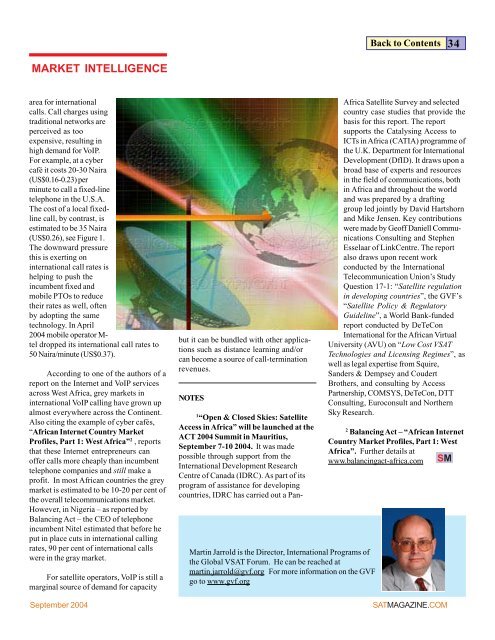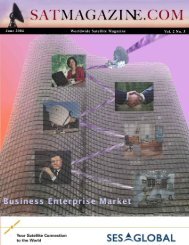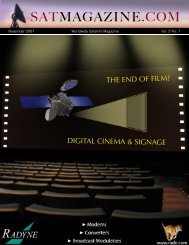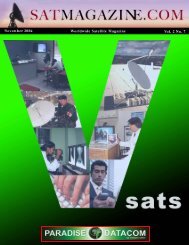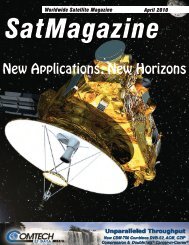September 2004 - SatMagazine
September 2004 - SatMagazine
September 2004 - SatMagazine
You also want an ePaper? Increase the reach of your titles
YUMPU automatically turns print PDFs into web optimized ePapers that Google loves.
Back to Contents<br />
34<br />
MARKET INTELLIGENCE<br />
area for international<br />
calls. Call charges using<br />
traditional networks are<br />
perceived as too<br />
expensive, resulting in<br />
high demand for VoIP.<br />
For example, at a cyber<br />
café it costs 20-30 Naira<br />
(US$0.16-0.23) per<br />
minute to call a fixed-line<br />
telephone in the U.S.A.<br />
The cost of a local fixedline<br />
call, by contrast, is<br />
estimated to be 35 Naira<br />
(US$0.26), see Figure 1.<br />
The downward pressure<br />
this is exerting on<br />
international call rates is<br />
helping to push the<br />
incumbent fixed and<br />
mobile PTOs to reduce<br />
their rates as well, often<br />
by adopting the same<br />
technology. In April<br />
<strong>2004</strong> mobile operator M-<br />
tel dropped its international call rates to<br />
50 Naira/minute (US$0.37).<br />
According to one of the authors of a<br />
report on the Internet and VoIP services<br />
across West Africa, grey markets in<br />
international VoIP calling have grown up<br />
almost everywhere across the Continent.<br />
Also citing the example of cyber cafés,<br />
“African Internet Country Market<br />
Profiles, Part 1: West Africa” 2 , reports<br />
that these Internet entrepreneurs can<br />
offer calls more cheaply than incumbent<br />
telephone companies and still make a<br />
profit. In most African countries the grey<br />
market is estimated to be 10-20 per cent of<br />
the overall telecommunications market.<br />
However, in Nigeria – as reported by<br />
Balancing Act – the CEO of telephone<br />
incumbent Nitel estimated that before he<br />
put in place cuts in international calling<br />
rates, 90 per cent of international calls<br />
were in the gray market.<br />
For satellite operators, VoIP is still a<br />
marginal source of demand for capacity<br />
<strong>September</strong> <strong>2004</strong><br />
but it can be bundled with other applications<br />
such as distance learning and/or<br />
can become a source of call-termination<br />
revenues.<br />
NOTES<br />
1<br />
“Open & Closed Skies: Satellite<br />
Access in Africa” will be launched at the<br />
ACT <strong>2004</strong> Summit in Mauritius,<br />
<strong>September</strong> 7-10 <strong>2004</strong>. It was made<br />
possible through support from the<br />
International Development Research<br />
Centre of Canada (IDRC). As part of its<br />
program of assistance for developing<br />
countries, IDRC has carried out a Pan-<br />
Martin Jarrold is the Director, International Programs of<br />
the Global VSAT Forum. He can be reached at<br />
martin.jarrold@gvf.org For more information on the GVF<br />
go to www.gvf.org<br />
Africa Satellite Survey and selected<br />
country case studies that provide the<br />
basis for this report. The report<br />
supports the Catalysing Access to<br />
ICTs in Africa (CATIA) programme of<br />
the U.K. Department for International<br />
Development (DfID). It draws upon a<br />
broad base of experts and resources<br />
in the field of communications, both<br />
in Africa and throughout the world<br />
and was prepared by a drafting<br />
group led jointly by David Hartshorn<br />
and Mike Jensen. Key contributions<br />
were made by Geoff Daniell Communications<br />
Consulting and Stephen<br />
Esselaar of LinkCentre. The report<br />
also draws upon recent work<br />
conducted by the International<br />
Telecommunication Union’s Study<br />
Question 17-1: “Satellite regulation<br />
in developing countries”, the GVF’s<br />
“Satellite Policy & Regulatory<br />
Guideline”, a World Bank-funded<br />
report conducted by DeTeCon<br />
International for the African Virtual<br />
University (AVU) on “Low Cost VSAT<br />
Technologies and Licensing Regimes”, as<br />
well as legal expertise from Squire,<br />
Sanders & Dempsey and Coudert<br />
Brothers, and consulting by Access<br />
Partnership, COMSYS, DeTeCon, DTT<br />
Consulting, Euroconsult and Northern<br />
Sky Research.<br />
2<br />
Balancing Act – “African Internet<br />
Country Market Profiles, Part 1: West<br />
Africa”. Further details at<br />
www.balancingact-africa.com SM<br />
SATMAGAZINE.COM


